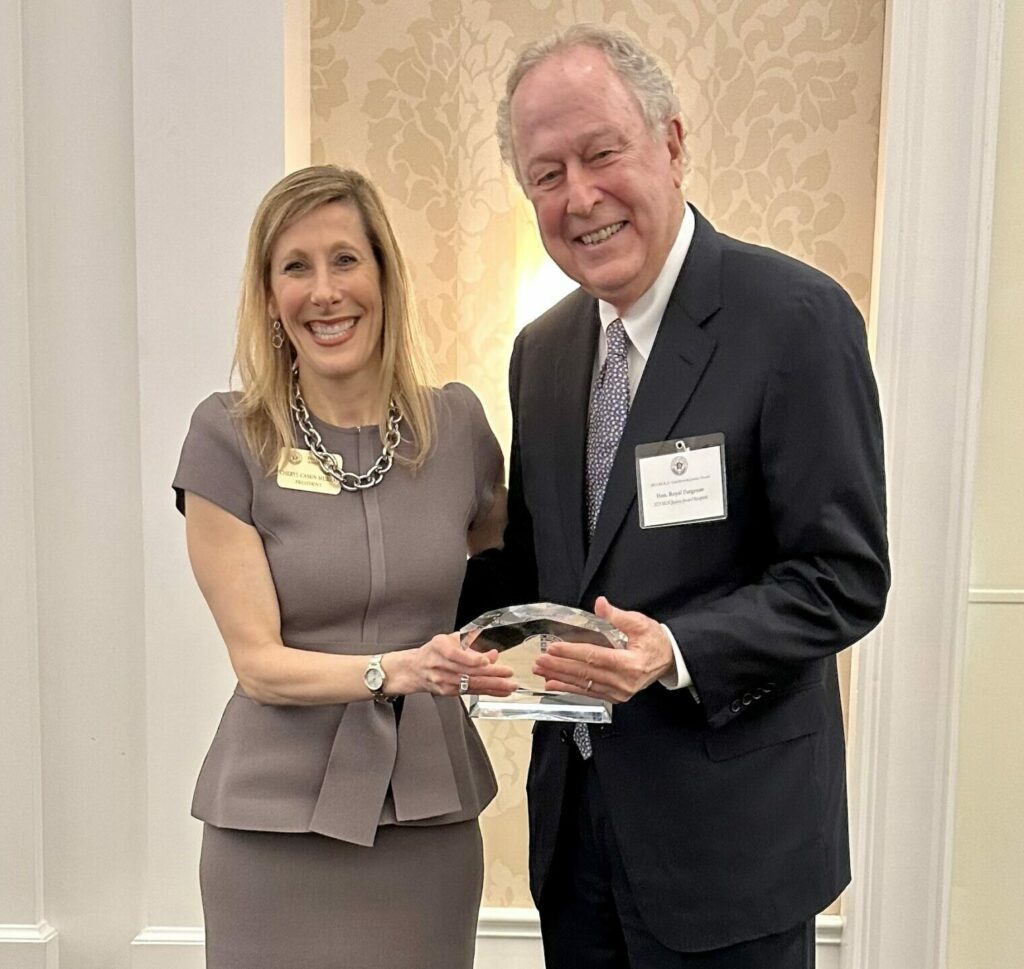
Royal Furgeson, retired federal judge, founding dean of the University of North Texas Dallas College of Law, and one of The Texas Lawbook’s 50 Lions of the Texas Bar, is the 31st recipient of the Dallas Bar Association’s Martin Luther King Jr. Justice Award, presented annually to local leaders whose lives and practices exemplify the principles embodied by Dr. King. (Previous recipients include Adelfa Callejo, Dallas Mayor Ron Kirk, U.S. District Judge Barefoot Sanders, state Rep. Raphael Anchia, Paul Quinn College President Michael J. Sorrell, and Karen Danielle McCloud, president of the Dallas Women Lawyers Association and the J.L. Turner Legal Association.)
Judge Furgeson, 81, was presented with the award at a luncheon Monday – Martin Luther King Jr. Day – at the Arts District Mansion, home of the DBA. In his acceptance speech, the judge recalled the principle at the heart of Dr. King’s work – equal justice for all – and the special duty of lawyers to uphold that principle. He also expressed his confidence that today’s law students, tomorrow’s lawyers, “are committed to be lawyers for the right reasons, and they will make us proud.”
“Better than we did, they will figure out what needs to be done and how to do it to move us forward,” he said. “We can count on them. We are in good hands.”
Following is the text of Judge Furgeson’s comments:
I wish to thank the Dallas Bar Association, the J.L.Turner Legal Association, the Dallas Hispanic Bar Association and the Dallas Asian American Bar Association for presenting me with this wonderful award. I am very grateful.
Equal justice under law. We aren’t there yet, are we? But because of Dr. King, we are much closer now than ever before.
I graduated from high school in 1960 in a world that was completely segregated, even after the Supreme Court decreed otherwise six years before. It took Martin Luther King and his leadership of the civil rights movement to change things. He paid the ultimate price in doing so, but all of us in this room are the direct beneficiaries of his sacrifice. Without him, I don’t want to consider where America would be today.
Our debt to him can only be paid by trying our best to carry on the struggle. Equal justice under law. Everyone has an obligation to make that happen, but for us as lawyers, it is central to our very being. That’s why we are here. It’s our most solemn obligation. It is our first responsibility.
While we have made progress, we must admit that we have miles to go before we bring full justice to our land. Nevertheless, we must not falter in the effort, because our democratic society is based on law and on the premise that all people are created equal and are therefore entitled to equal justice. Every person has dignity and value and has the right to live their life free from fear, harassment or discrimination, regardless of their differences.
When he was in the Birmingham jail, Dr. King wrote his famous letter, setting forth our dilemma: “Injustice anywhere is a threat to justice everywhere.” The challenge is to conquer the threat.
Will we ever get there? There are times when it seems too much to even consider, but let us not forget Dr. King’s optimism. Remember his celebrated words: “The arc of the moral universe is long, but it bends toward justice.” After everything he endured, he still remained hopeful. I must also tell you that I remain hopeful, not just because of Dr. King’s example, but also because I have seen the future of our profession, in the person of today’s law students when I was at UNT Dallas College of Law. They are fiercely dedicated to equal justice under law, and they bring a special insight to the task as they fill our ranks with the diversity of our people. You will find this same coming from law students at SMU and Texas A&M and at law schools across our great land. They are committed to be lawyers for the right reasons, and they will make us proud.
This new generation also understands, to their core, the wisdom of the ancient rabbi who instructed: “Do not be daunted by the enormity of the task. You are not obligated to finish it, but neither are you free to abandon it.”
As lawyers, bringing about equal justice under law is indeed a daunting task, with no end in sight. But it is our special duty to keep at it, and we can never abandon it without risking everything. In my view, our next generation knows this, heart and soul, and is ready to do what is required to stay the course. Better than we did, they will figure out what needs to be done and how to do it to move us forward. We can count on them. We are in good hands.
I am especially grateful to receive this award in the presence of my wife Marcellene, our family, including our children and grandchildren, and all my brothers and sisters from the judiciary, my past law clerks, my students and colleagues in the legal academy, and all my dear friends. I appreciate that you have been so kind to me. I can attest that kindness is good. Let’s pass it on.
